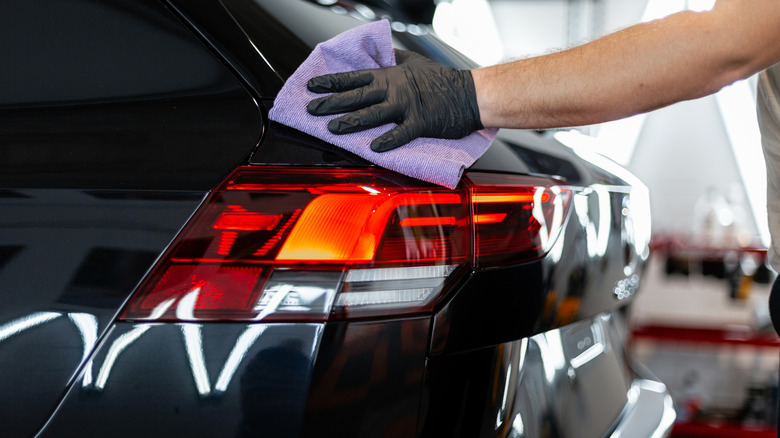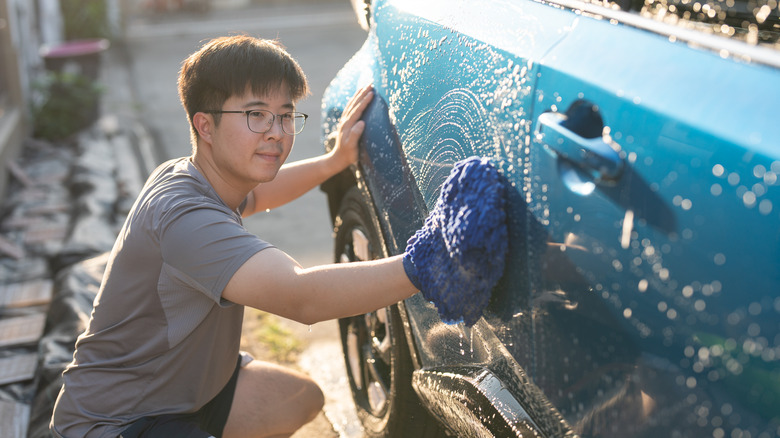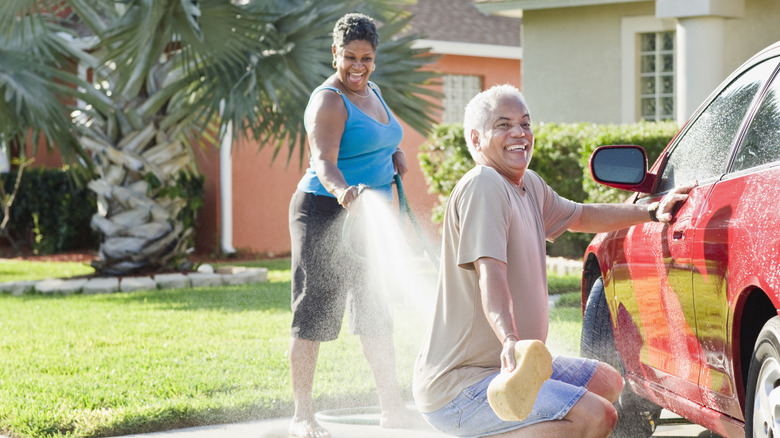Which Is Cheaper: Washing Your Car By Hand Vs. Using A Car Wash
We may receive a commission on purchases made from links.
Cleaning your car comes down to two options: wash it yourself or use an automatic car wash. Going DIY could be cheaper if you've got the essentials like a bucket, sponges or microfiber clothes, and soap. Water usage is a consideration too, as washing your car at home can consume between 40 to 140 gallons, depending on your method. If you need a new hose to help manage this, the $40 Flexzilla Garden Hose is a good option. It's designed to reach all parts of your vehicle, helping to prevent water waste. For a deep clean, keep in mind the upfront costs of extras like wax, tire cleaners, and detailing brushes. If you're starting from scratch, consider the Chemical Guys 14-Piece Car Wash Kit with Foam Gun. It comes complete with a bucket, microfiber cloths, cleaning chemicals and costs between $70 to $125.
Automatic car washes are hassle-free with no personal investment required. You can pay between $5 to $15 for a basic drive-through. For more deluxe touchless or soft-touch options, expect to pay $8 to $20 per wash. A full-service wash that includes vacuuming and interior cleaning ranges from as low as $30 for a basic package up to $250 for more comprehensive services that might include additional detailing options. Many car washes also provide membership plans, offering unlimited washes for a monthly fee, usually between $30 and $42.99.
Pros and cons of each option
Hand washing your car lets you pick the perfect products for your vehicle's paint, reducing the chance of damage and tackling tough dirt in tricky spots. Still, it demands time and elbow grease to wash, rinse, and dry properly. The wrong sponge or sloppy rinsing can also scratch up your car's paint. If this happens, fixing it is relatively inexpensive, from $150 to $300. For scratches that reach the primer or metal, repairs can range from $500 to $1,500.
Automatic car washes might be the best option if you are on tight schedules or have limited space at home to wash your car or store supplies. The major appeal of every car wash is the quick and convenient cleaning, often with high-pressure water and detergents that clean your car without touching the paint job, which lowers the chance of scratches. However, they are not without flaws.
While the price of a single car wash might seem modest at $15 or so, with frequent visits, you will feel the burn. If you wash your car once a week, it sums up to about $60 a month, and approximately $780 yearly. In five years, a total of $3,900. Besides, if you are on a budget and opt for a cheaper cleaning option, these washes may not clean hard-to-reach areas like wheel wells and undercarriages, allowing dirt to accumulate over time.
Long-term value, whichever you choose
We seem to be caught between what's best for the car versus what's best for us. And it's not strange. We face the same dilemma even when we go car shopping: do you buy new, buy used, or lease? All options have some financial and maintenance implications that go beyond the immediate cost. Washing your car by hand can save you money, especially if you wash it often. Buying your own supplies means you're set for many washes and careful hand washing can protect your car's exterior, helping you dodge future costs.
Automatic car washes often have monthly plans that offer unlimited washes for a fixed price. This is convenient for frequent users but the harsh brushes can scratch your car's paint, potentially leading to extra costs for touch-ups. Touchless options are gentler but might not clean as deeply, possibly requiring you to occasionally hand wash or detail your car. Automatic washes can also miss smaller issues like chips or rust, which could turn into bigger problems if not caught early.
Ultimately, choosing between hand washing and automatic washes depends on your priorities. If you prefer complete control over your car's care and don't mind spending the time, hand washing is likely your best bet for the long haul. However, if you value convenience and are okay with the potential long-term costs of frequent automatic washes, that might be the way to go.


